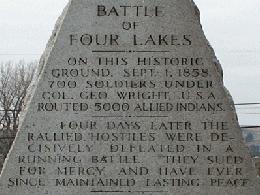On September 1, 1858, some 500 U.S. Army troops under Colonel George Wright (1803-1865) defeat somewhat fewer than 500 Native Americans at Four Lakes near what will become Spokane. Wright is engaged in a punitive military expedition against the Yakama, Palouse, Spokane, and Coeur d'Alene tribes after their defeat of a force under Lieutenant Colonel Edward Steptoe (1816-1865) in May. Unlike Steptoe's soldiers, Wright's forces are armed with long range rifles firing newly developed minié balls. Warriors attack Wright's camp and he counterattacks. The battle lasts four hours and the Native Americans are driven off with heavy losses.
Wright's campaign stemmed from the defeat of Lieutenant Colonel Edward J. Steptoe and a small force of mounted soldiers on May 17 and 18, 1858, near what would become Rosalia. Steptoe was attempting to punish the Palouse tribe for the killing of white settlers (the land east of the Cascades had been closed to settlement by the Army). From his base at Walla Walla, Wright, assisted by Nez Perce scouts, launched a campaign against the tribes north of the Snake River.
On August 30, warriors attempted to stampede the pack train, but the green grass would not burn. Wright camped near a series of four lakes. The next morning, the warriors attacked, but were overwhelmed by the soldiers' firepower and tactics. At one point, dragoons rode down Indians slashing with their sabers. After the regulars turned back, the Nez Perce scouts pursued their enemies for eight or 10 miles.
A monument marks the site of the battle, with the information carved on it that "700 U.S. soldiers" faced "5,000 allied Indians." The "5,000 allied Indians" figure is wildly exaggerated. More accurately, in The Spokane Indians: Children of the Sun, Robert H. Ruby and John A. Brown state on page 133, "Somewhat in excess of five hundred hostiles were suppose to have been in [the Battle of Spokane Plain], more warriors than at Four Lakes." The number of U.S. soldiers was actually about 500, along with probably another 200 mule skinners, Nez Perce scouts, and volunteers.
At Four Lakes, no American soldiers were killed.

